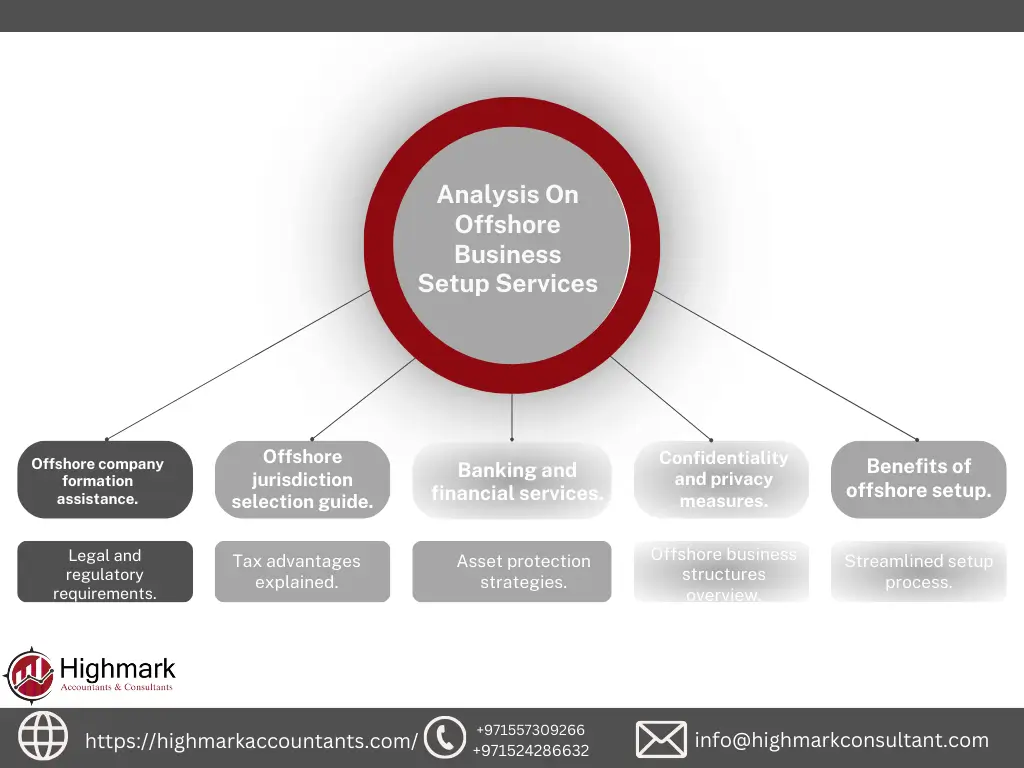How Long Do Offshore Company Formations Really Take? What to Expect
Wiki Article
Just How Offshore Firm Formations Work: A Detailed Introduction for Business Owners
Offshore firm formations can give significant benefits for entrepreneurs looking for tax optimization and asset protection. The process entails numerous important actions, beginning with mindful territory selection and comprehensive paperwork prep work. Involving specialist solutions is essential for compliance. Numerous forget the ongoing duties that follow first enrollment. Recognizing these complexities can make a considerable distinction in leveraging offshore opportunities efficiently. The next steps are essential for long-term success.Understanding Offshore Firms: What They Are and Why They Issue
The principle of offshore business may appear complex, recognizing their fundamental nature and value is important for both businesses and people seeking to optimize their monetary techniques. Offshore companies are entities signed up outside the individual's nation of home, frequently in territories that provide favorable governing atmospheres. These businesses can provide numerous advantages, such as tax obligation optimization, asset security, and enhanced privacy.For business owners, establishing an overseas company can facilitate global trade, reduce functional prices, and increase market reach. In addition, offshore companies commonly permit structured conformity with global policies. People may additionally use overseas frameworks to safeguard personal possessions from economic or political instability in their home nations. Ultimately, the allure of overseas companies hinges on their capability to boost financial versatility and supply tactical benefits in an increasingly interconnected global economy - Offshore Company Formations. Recognizing their functional structure and advantages is essential for making informed decisions
Picking the Right Jurisdiction for Your Offshore Firm
Selecting the ideal territory for an overseas firm is important for making best use of tax obligation advantages and ensuring compliance with local policies. Different jurisdictions offer varying tax rewards and regulative settings that can greatly affect service operations. Consequently, a mindful assessment of these aspects is essential for informed decision-making.Tax Obligation Benefits Overview
When considering the facility of an overseas firm, recognizing the tax benefits related to numerous territories is necessary. Various locations offer one-of-a-kind benefits, such as low or absolutely no business tax prices, which can greatly boost productivity. Some territories offer tax incentives for specific sorts of organizations, drawing in business owners seeking lowered tax liabilities. Furthermore, certain nations impose favorable tax obligation treaties that reduce dual tax on worldwide income, guaranteeing that companies retain more profits. The selection of territory additionally affects value-added tax (VAT) and various other local tax obligations. Entrepreneurs must examine these factors meticulously to choose a location that straightens with their service goals, enhancing tax performance while remaining compliant with global regulations.Regulatory Atmosphere Considerations
Picking the best territory for an offshore company requires a detailed understanding of the regulatory environment, as different countries enforce varying degrees of conformity and governance. Business owners have to assess factors such as lawful structures, tax laws, and reporting responsibilities. Territories like the British Virgin Islands and Cayman Islands are typically preferred for their business-friendly laws and very little coverage requirements. Alternatively, some nations may enforce stringent policies that might complicate procedures and enhance expenses. In addition, the political stability and reputation of a territory can impact the long-lasting practicality of the overseas company. Subsequently, careful factor to consider of these governing aspects is important to assure that the picked territory lines up with the business's calculated objectives and operational needs.Preparing the Necessary Documentation
Preparing the required documentation is a crucial action in the offshore firm formation procedure. Business owners have to collect numerous lawful and identification files to facilitate their company's establishment in a foreign territory. Generally, this includes a comprehensive company plan outlining the company's goals and operational techniques. Furthermore, personal identification records, such as tickets or driver's licenses, are called for from the business's directors and shareholders.In most cases, proof of address, like utility bills or bank declarations, is required to confirm the identities of the involved events. Certain kinds dictated by the territory, including application kinds for registration, should be finished accurately. Some jurisdictions might additionally require an affirmation of the nature of business tasks and compliance with regional laws. Extensively preparing these documents guarantees a smoother enrollment process and aids alleviate possible hold-ups or problems, eventually setting a solid foundation for the offshore entity.
Engaging Professional Solutions for Offshore Formation
Involving specialist solutions in overseas development can significantly improve the performance and effectiveness of the process. Entrepreneurs frequently encounter intricacies that can be frustrating, making skilled support indispensable. Professional companies concentrating on offshore formations provide a riches of knowledge pertaining to territory selection, company framework, and local market conditions.These professionals can assist in drafting important documentation, guaranteeing accuracy and compliance with specific requirements. They additionally help improve communication with regional authorities, minimizing the probability of misunderstandings or hold-ups. Additionally, expert services can use understandings right into strategic benefits, such as tax benefits and property security, tailored to the business owner's details requirements.
Navigating Regulatory Compliance and Legal Requirements
Understanding the regulatory landscape is essential for business owners starting on offshore business formations. Conformity with worldwide regulations and local regulations is essential to prevent legal mistakes. Each jurisdiction has particular requirements relating to company registration, reporting, and taxation, which have to be thoroughly researched.Business owners need to familiarize themselves with the laws regulating company structure, possession, and functional practices in the picked offshore location. In addition, anti-money laundering (AML) and recognize your customer (KYC) regulations often apply, calling for appropriate documentation and verification procedures.
Involving with attorneys who concentrate on overseas solutions can provide important support on maneuvering with these intricacies. Guaranteeing conformity not only safeguards the firm from potential legal problems yet also improves reliability with capitalists, companions, and regulators. By sticking to the prescribed legal structures, business owners can efficiently utilize the benefits of overseas company formations while lessening risks connected with non-compliance.
Establishing Financial and Financial Accounts

When a suitable financial institution is identified, entrepreneurs usually need to prepare and submit various documents, including proof of identification, organization enrollment files, and a summary of the intended company tasks. (Offshore Company Formations)
Some banks might likewise need a minimum deposit to open an account. Entrepreneurs ought to be prepared to respond to concerns relating to the resource of funds and service operations. By completely comprehending the financial landscape and conforming with the financial institution's demands, business owners can protect their offshore company has seamless accessibility to crucial financial services for reliable operation.
Maintaining Your Offshore Company: Ongoing Responsibilities and Ideal Practices
Keeping an overseas business involves several recurring duties that are crucial for compliance and operational honesty. Trick facets consist of sticking to annual conformity needs, keeping accurate financial documents, and comprehending tax responsibilities. These aspects are essential for guaranteeing the company's longevity and legal standing in its jurisdiction.Yearly Conformity Demands
While establishing an offshore company offers various advantages, it also entails recurring duties that can not be overlooked. Yearly compliance requirements differ by territory yet generally include submitting yearly returns and economic statements to regional authorities. Firms should likewise pay annual costs, which can include registration renewals and taxes, depending on the place. Additionally, numerous territories require keeping a registered workplace and a local agent. Failure to abide with these laws can lead to charges, including penalties or also dissolution of the business. Business owners must also be mindful of any adjustments in neighborhood laws that may influence their conformity commitments. Staying informed and organized is vital for keeping the benefits of an offshore business while satisfying lawful obligations efficiently.Preserving Financial Records
Conformity with annual requirements is just component of the recurring obligations connected with offshore company monitoring. Keeping precise monetary records is vital for guaranteeing openness and liability. Business owners must systematically record all anchor purchases, consisting of revenue, expenditures, and properties. This practice not only help in inner decision-making yet also prepares the company for potential audits from regulative authorities.Routinely updating financial statements, such as revenue and loss accounts and annual report, is vital for tracking the company's financial health. Utilizing accounting software application can enhance this procedure, making it much easier to keep and create reports compliance. Furthermore, business owners must consider seeking professional accounting services to guarantee adherence to regional guidelines and ideal practices, consequently protecting the integrity and online reputation of their offshore procedures.

Tax Responsibilities Summary
Guiding via the intricacies of tax commitments is important for the effective management of an overseas firm. Entrepreneurs have to recognize the tax guidelines of both their home country and the territory where the overseas entity is established. Conformity with local tax laws is essential, as failure to stick can result in fines or legal concerns. Consistently submitting required income tax return, even when no tax obligation might be owed, is commonly called for. Additionally, keeping current and exact monetary documents is important for showing compliance. Consulting from tax obligation experts familiar with worldwide tax obligation regulation can assist browse these responsibilities effectively. By applying best techniques, business owners can ensure that their offshore procedures continue to be legally certified and economically viable.
Regularly Asked Questions
Just how Lengthy Does the Offshore Company Development Process Typically Take?
The overseas company development procedure usually varies from a few days to numerous weeks. Elements affecting the timeline include territory, documentation needs, and responsiveness of legal and economic organizations entailed in the setup.What Are the Expenses Related To Preserving an Offshore Firm?
The costs related to keeping an offshore business can differ widely. They commonly include yearly enrollment fees, conformity costs, accounting solutions, and feasible legal charges, depending on the jurisdiction and details company tasks involved.Can I Open Up a Personal Savings Account for My Offshore Business?
Opening up a personal bank account for an overseas company is normally not allowed. Offshore accounts must be organization accounts, mirroring the firm's activities, therefore adhering to policies and ensuring proper economic administration and lawful responsibility.Are There Constraints on International Possession of Offshore Firms?

What Happens if I Fail to Adhere To Offshore Rules?
Failure to follow overseas guidelines can lead to extreme penalties, including substantial fines, loss of organization licenses, and possible criminal costs. Additionally, non-compliance may cause reputational damages and difficulties in future organization procedures.
Offshore companies are entities Get More Info registered outside the person's nation of residence, often in jurisdictions that use desirable governing settings. Picking the appropriate jurisdiction for an offshore company is vital Visit Your URL for making the most of tax benefits and making sure conformity with neighborhood regulations. When considering the establishment of an offshore firm, understanding the tax obligation advantages linked with numerous territories is important. Choosing the best jurisdiction for an offshore company requires an extensive understanding of the regulative atmosphere, as different countries impose varying levels of compliance and governance. Additionally, the political security and credibility of a jurisdiction can influence the long-term stability of the offshore firm.
Report this wiki page